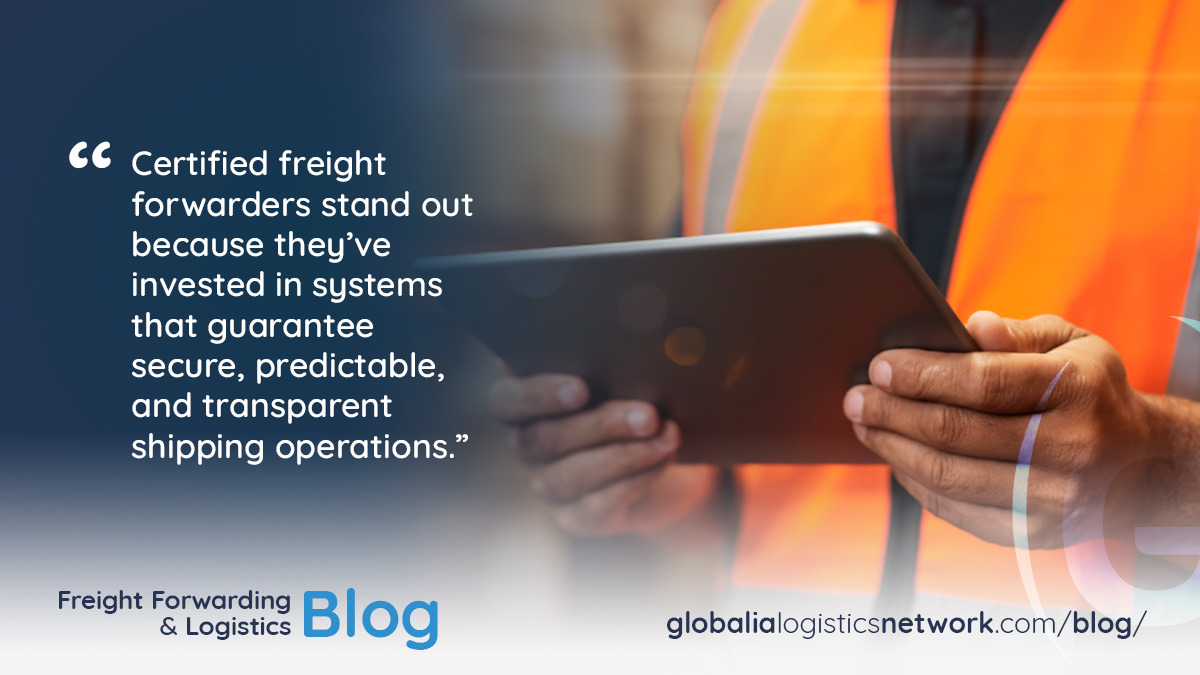CTPAT, AEO, and ISO: The Certifications Every Freight Forwarder Should Know
If you’ve ever wondered why some freight forwarders seem to glide through customs while others get stuck in endless clearance delays, the answer might just be a few acronyms long: CTPAT, AEO, and ISO. These are the backbone of modern supply chain security and proof that a logistics company runs tight, reliable, and globally recognized operations. In an industry where every delay costs money and reputation, understanding these certifications have become essential. Let’s break down why these freight forwarding certifications matter, what they actually mean, and how getting them could give your company a serious edge in global trade.

The Growing Importance of Logistics Certification
International logistics today hinges on trust. Governments and multinational clients want assurance that the people handling their shipments are compliant, secure, and consistent. That’s where logistics certification plays an important role. Having internationally recognized credentials like CTPAT certification, AEO status, or ISO standards in logistics does more than boost your credibility. It literally helps your shipments move faster, reduces inspections, and strengthens client confidence. These programs set a common language of trust between you, your partners, and customs authorities. The logistics landscape is increasingly compliance-driven, and companies without certifications often find themselves at a disadvantage. When clients have to choose between a certified and a non-certified freight forwarder, they’ll go with the one that can promise faster customs clearance with AEO and stronger risk management every single time.
What Is CTPAT and Why It Matters
Let’s start with CTPAT, short for Customs Trade Partnership Against Terrorism. Established by U.S. Customs and Border Protection, it’s one of the most well-known supply chain security certifications in the world.
For freight forwarders, the benefits of CTPAT are clear:
-
Reduced cargo inspections at U.S. ports
-
Priority processing during customs checks
-
Access to a network of other verified trade partners
-
Lower risk scores, which translates to smoother international operations
Think of CTPAT certification as a fast pass through one of the most stringent customs systems in the world. But apart from quicker clearance, it’s also about building trust with importers and exporters who need assurance that their shipments are handled securely. Getting certified involves a thorough security assessment of your company’s procedures, facilities, and partners. It may sound intense, but once you’re part of the program, your reputation gets a solid boost in the global logistics arena.
AEO Benefits: Recognition Beyond Borders
While CTPAT focuses primarily on the United States, AEO (Authorized Economic Operator) status is the global counterpart. Overseen by the World Customs Organization (WCO), AEO programs are active in over 80 countries and growing fast.
So what are the AEO benefits for freight forwarders?
-
Faster customs clearance through trusted trader status
-
Fewer physical and document-based checks
-
Recognition across multiple countries through mutual recognition agreements
-
Enhanced relationships with customs authorities
Essentially, being AEO certified tells the world you’re a trusted, compliant, and low-risk operator. If you’re wondering how to get AEO certified, it generally requires submitting a detailed application to your national customs authority, demonstrating compliance with customs regulations, financial stability, and effective internal controls. The effort pays off. AEO-certified companies often experience measurable improvements in operational efficiency and client retention because they can offer a more predictable and reliable service.
The Role of ISO Standards in Logistics
While CTPAT and AEO focus on security and compliance, ISO standards in logistics zero in on quality management and consistency. ISO 9001 for logistics companies, for instance, establishes a framework for continuous improvement, process efficiency, and customer satisfaction. An ISO-certified logistics company signals professionalism at every level, from warehouse operations to documentation accuracy. It means your internal processes have been audited and verified against international benchmarks.
These certifications also improve communication between global partners, reduce errors, and help maintain accountability throughout the supply chain security process. For freight forwarders, ISO standards can also act as a bridge between regional and international compliance systems, reinforcing the reputation of being reliable and meticulous.
Why Freight Forwarding Certifications Are Worth the Cost
Yes, certification comes with a price tag. The cost of supply chain certifications varies depending on the company’s size, complexity, and location. But it’s better viewed as an investment rather than an expense. The benefits include priority treatment at customs, fewer disruptions, improved client confidence, and access to new markets, which far outweigh the cost and effort involved. Moreover, as supply chains become increasingly digitized and regulated, having these certifications can be the deciding factor between winning or losing major contracts.
Certified companies face fewer cargo holds and benefit from quicker dispute resolution when things go wrong. Non-certified ones? They’re often first in line for inspection and last in line for clearance. So the debate of certified vs non-certified freight forwarders isn’t really a debate anymore. Certification is quickly becoming the standard, not the exception.
Logistics Certification: A Competitive Advantage for Freight Forwarders
In today’s market, logistics certification is a strategic asset. Certified freight forwarders stand out because they’ve invested in systems that guarantee secure, predictable, and transparent shipping operations. From a client’s perspective, working with a certified forwarder means peace of mind. It assures them that every link in the supply chain, from loading to delivery, is governed by internationally accepted best practices. And as governments tighten cargo security measures worldwide, certifications like CTPAT, AEO, and ISO 9001 become a natural filter for business partnerships. It’s no coincidence that the most successful freight forwarders tend to be the most certified ones, too.
How Globalia Helps Freight Forwarders Level Up
For independent freight forwarders, keeping up with compliance can feel overwhelming. That’s where joining a reliable global network like Globalia Logistics Network makes a real difference. Globalia connects certified and vetted freight forwarders across more than 130 countries, creating a trusted community that values transparency, professionalism, and growth. Members gain exposure to new partners, access to shared projects, and insights into best practices. In an era where supply chain security defines business continuity, Globalia gives small and mid-sized forwarders the global reach and credibility they need to compete with larger multinationals.
Additionally, Globalia Logistics Network now offers a variety of online courses designed to help members deepen their logistics expertise and expand their understanding of the freight forwarding industry. As a Globalia member, you’ll learn directly from Globalia’s academic partner, CIFFA, on key supply chain subjects from fundamental freight training and problem-solving to specialized modules on perishables, pharmaceuticals, document handling, and SOC containers.
How Certifications Strengthen Supply Chain Security
When you stack them together, CTPAT certification, AEO status, and ISO standards logistics create a powerful triangle of protection for global trade. Each addresses a different layer of risk. security, compliance, and quality but together, they form a holistic defense against disruption. They reduce vulnerability to theft, smuggling, and data breaches while improving visibility across the supply chain. In short, these certifications are safeguards for your business, your clients, and the cargo you move.
The Bottom Line
Global trade is becoming more complex. Delays, inspections, and compliance issues can hit even the best forwarders but those with logistics certification stand on much firmer ground. The benefits of CTPAT for freight forwarders, AEO recognition, and ISO quality systems can be strategic for small and mid-sized logistics companies. They improve efficiency, build trust, and make your business a preferred partner in an increasingly demanding market. So if you haven’t yet explored these programs, now’s the time. Get certified, stay compliant, and turn those acronyms into your biggest competitive advantage.


